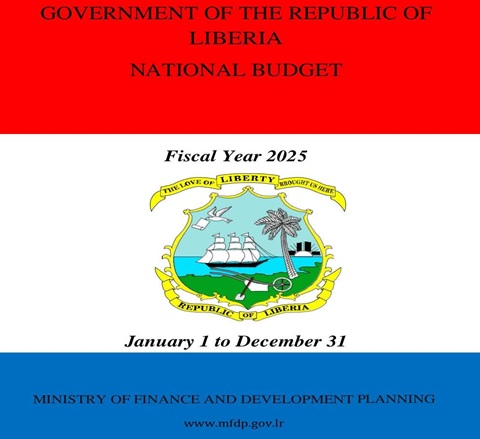MONROVIA – A detailed analysis of Liberia’s 2025 Approved National Budget has raised serious concerns over increasing government spending on top officials while the nation grapples with extreme poverty and unemployment. The analysis, conducted by activist Martin K. N. Kollie, reveals a troubling pattern of public waste and extravagant allocations to the country’s highest political offices despite a growing outcry for fiscal responsibility.
At the heart of the controversy is the sharp increase in funding for the offices of President Joseph Boakai, Vice President Jeremiah Koung, and other senior legislative leaders. According to the analysis, out of the total approved budget of US$880.66 million for Fiscal Year 2025, a staggering US$773.95 million, approximately 87.9%, is allocated to recurrent expenditures. These funds are set aside to cover salaries, benefits, luxury vehicles, foreign travel, entertainment, and other non-essential items.
Only US$106.72 million, representing 12.1% of the total budget, is designated for public investment. Critics argue that this meager allocation to infrastructure and social programs reflects a government more concerned with maintaining a lavish lifestyle for its leaders than addressing the pressing needs of its citizens. Despite Liberia’s status as one of the world’s poorest countries, government officials continue to demand foreign aid while increasing their own budgets.
The analysis highlights significant increases in spending on the offices of the nation’s most powerful figures. Vice President Jeremiah Koung’s budget rose from US$3.7 million to US$3.9 million. Similarly, Senate Pro-Tempore Nyonblee Karnga-Lawrence’s office saw its allocation climb from US$1 million to US$1.2 million. Even more striking is the jump in the budget for Deputy Speaker Thomas Fallah, which nearly doubled from US$645,000 to US$1.2 million.
President Boakai’s office also saw a substantial rise in its budget. In the 2024 fiscal year, his office was allocated US$1.7 million, but the 2025 Approved Budget increased that amount to US$3.4 million. This dramatic increase comes amid mounting concerns about Liberia’s economic challenges, including an unemployment rate exceeding 90% and growing frustration over the government’s inability to address the country’s deepening poverty.
The combined allocations for the offices of these five officials, President Boakai, Vice President Koung, Senate Pro Tempore Karnga Lawrence, Majority Block Speaker Richard Nagbe Koon, and Deputy Speaker Thomas Fallah, amount to US$11.3 million in the 2025 Approved Budget. This marks a US$740,000 increase from the US$10.6 million proposed in the draft version. Critics have questioned the necessity of these increases, particularly when public resources are stretched thin and many Liberians struggle to meet basic needs.
Observers note that the upward trajectory in government spending contradicts the promises of President Boakai’s so called “Rescue Mission,” which aimed to prioritize the welfare of ordinary citizens. Instead, analysts argue, the current budgetary trends suggest a continuation of business as usual, where public resources are exploited to enrich political elites while the broader population is left behind.
The spending increases have made renewed calls for greater transparency and accountability. Activists, including Kollie, argue that public service should focus on improving the lives of citizens rather than enriching those in power. “The suffering in Liberia is artificial. It is man-made,” Kollie asserted, pointing to greed and corruption as the driving forces behind the country’s economic hardship.
Further complicating matters is the government’s ongoing request for foreign aid, despite the extravagant spending on public officials. Both former U.S. President Donald Trump and billionaire Elon Musk have voiced skepticism about continuing aid to Liberia, given the nation’s apparent misuse of public funds. Critics argue that if Liberia can afford to allocate millions of dollars to its political leaders, it should not be relying on international assistance to sustain basic services.
The House of Representatives and the Senate, which approved the budget, have faced backlash from civil society organizations and independent analysts. Many argue that the national budget has become a tool for political patronage, allowing elected officials to funnel public money into their own pockets while essential public services remain underfunded.
Kollie’s analysis warns that unless President Boakai takes swift and decisive action to curb waste and tackle corruption, his administration risks losing public trust. Recommendations from fiscal watchdogs and activists include cutting back on non-essential spending, reducing excessive benefits for public officials, and increasing investments in health care, education, and infrastructure.







